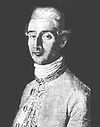
Felix Maria de Samaniego
Encyclopedia

Álava
Álava is a province of Spain and a historical territory of the Basque Country, heir of the ancient Lord of Álava. Its capital city is Vitoria-Gasteiz which is also the capital of the autonomous community...
, in the Basque Country, was a Spanish
Spain
Spain , officially the Kingdom of Spain languages]] under the European Charter for Regional or Minority Languages. In each of these, Spain's official name is as follows:;;;;;;), is a country and member state of the European Union located in southwestern Europe on the Iberian Peninsula...
neoclassical
Spanish Enlightenment literature
Spanish Enlightenment literature is the literature of Spain written during the Age of Enlightenment.During the 18th century a new spirit was born which swept away the older values of the Baroque and which receives the name of "Enlightenment"...
fabulist
Fable
A fable is a succinct fictional story, in prose or verse, that features animals, mythical creatures, plants, inanimate objects or forces of nature which are anthropomorphized , and that illustrates a moral lesson , which may at the end be expressed explicitly in a pithy maxim.A fable differs from...
, educated at Valladolid
Valladolid
Valladolid is a historic city and municipality in north-central Spain, situated at the confluence of the Pisuerga and Esgueva rivers, and located within three wine-making regions: Ribera del Duero, Rueda and Cigales...
. A government appointment was secured for him by his uncle the Count de Peñaflorida.
His Fábulas (1781–1784), one hundred and fifty-seven in number, were originally written for the boys educated in the school founded by the Biscayan Society. In the first installment of his fables he admitted that he had taken Tomás Iriarte
Tomás de Iriarte y Oropesa
Tomás de Iriarte y Oropesa , was a Spanish neoclassical poet.- Life :...
for his model, a statement which proves that he had read Iriarte's fables in manuscript; he appears, however, to have resented their publication in 1782, and this led to a rancorous controversy between the former friends. Samaniego, however, was highly original in the matters of quiet humour and careless grace, and his popularity kept on growing.

